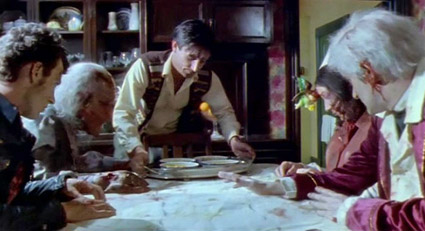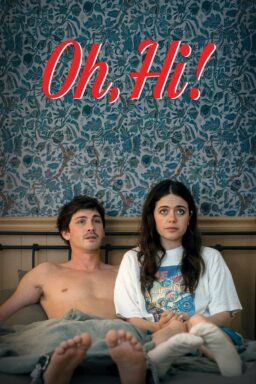
As you may already have guessed from its title, “Dead Alive” is a zombie flick, and the employees do what they should do in zombie movie without hesitation. That poor guy’s right hand is bitten, so his right hand is quickly severed with a machete in front of our eyes. And then they also see a scar in his other arm, so we see his left arm amputated. And then they find another scar on his forehead…do I really have to tell you what they do next?

If you find this sight pretty gory, I have to tell you that it’s merely the tip of the iceberg. “Dead Alive” has maintained its infamous status as one of the most disgusting horror films ever made, and you will be treated with gruesome moments which certainly make you cringe and wince; you may want to stop watching it as being repulsed and disgusted by it.
Nevertheless, once you understand that this is a black comedy which goes far, far over the top with its gleeful no-holds-barred approach to its rotting zombie bastards, you can have some good laughs–while holding your barf bag just in case. To be frank, I found the movie pretty disgusting when I saw it movie for the first time, but I found myself laughing out loud several times as my eyes were amazed by its bloody outrageousness. While going all the way to the extreme, the movie rushes to its deranged comic finale, and it is as riotous as, say, Mel Brooks‘s comedies.

After that hilariously gory opening scene, the creature in question, which later turns out to be a very evil rat monkey with nasty traits, is sent to the zoo in Wellington, New Zealand. It is kept well in the zoo, but a bad incident eventually happens; Mrs. Vera Cosgrove (Elizabeth Moody) unwittingly gets bitten by it while she is spying on her son (Timothy Balme) and his first girlfriend Paquita (Diana Peñalver). Good news: she quickly takes care of that mean rat monkey with her high-heeled shoe for the safety of mankind in the future. Bad news: although she seems all right at first, her condition quickly worsens during the night, and, in the next morning, Lionel is horrified to find what has happened to his dear mother.
Her symptoms are familiar. First, it is just a festering wound in her left arm which keeps leaking pinky pus. Second, her speech is more slurred than usual. Third, her skin becomes more fragile than before, so we get a funny moment when Lionel puts a dangling patch of her facial skin back to its original place with glue after she accidentally rips it away. Fourth, she has an increasingly unusual appetite for meat – especially live flesh. “Your mother ate my dog!” – “Not all of it.”
While all these outrageous things are happening around him, Lionel does what he should do as a dutiful mama’s boy who richly deserves the Norman Bates award. As her mother becomes more violent and more voracious after her, uh, “official death,” he locks her up in the basement, but troubles keep being piling up as he struggles to manage his situation. The problem is, his mother keeps making other people into fellow zombies, and now he has to take care of them as well as her while he hides them from the eyes of his neighbours, including his girlfriend.

Thanks to the now-legendary director/co-writer Peter Jackson and his crew, we are served with a lot of grotesque sights which are as morbid as “Re-Animator” (1985) and as bloody as “Evil Dead 2: Dead by Dawn” (1987), to say the least. There is an unspeakable scene at the dining room which can make you have a second thought about eating custard pudding, and then we get a truly twisted moment while Lionel tries to feed a quartet of zombies with meat soaked with tranquilizer. One zombie cannot consume food because her head is almost ripped off from her body, so Lionel resorts to a disgusting but only logical way to put the food into her stomach.
The movie sounds like something unbearable to watch, but once you get accustomed to its goriness (it’s easier than you think), it becomes hysterically funny in its own crazy way, driven by its zany energy and whimsy creativity. One of the funniest moments in the movie comes from the local priest Father McGruder (Stuart Devenie); as soon as he comes across the zombies at the town cemetery , he zealously brandishes his hidden skills. in the name of the Lord during a frantic showdown with them, and this uproarious fight scene ends with a nice touch suitable to his profession.
The zombies in the movie are disgustingly funny puppets ready to mutilate the living or to be mutilated. Like many critics, I usually find zombies uninteresting and boring because they are only left with the desire for live flesh in their rotten brains while aimlessly moving around without purpose, but the zombies in “Dead Alive” become playful and wacky as the elastic players of bloody slapstick comedy while the story gets gorier. We cringe at the vile sexual attraction between two zombies and their subsequent intercourse, and then we are tickled by an humorous homage to “It’s Alive” (1974) as their proud result. We all know zombies are hard to kill, but one of them in the movie is especially persistent – even when he is separated into three independent parts. As far as I remember, this is the only horror movie where a zombie, or a part of zombie, pleas for its life with a pair of lungs instead of a pair of hands.

What an unlucky guy Lionel is, by the way. Because his dad died when he was very young, he was raised by his domineering mother, and he has always obeyed her although she has treated him pretty much like a slave under her command in their big house which looks over the neighbourhood from a high place (the movie makes no secret about the influence from “Psycho” (1960). When Paquita, a pretty girl who seems to be out of his league, approaches him just because she believes he is the man of her life foretold as by her grandmother, he bravely decides to take a chance with her, but he finds himself still stuck with his mom. To make the matter worse, as a living dead, his mom will never go away unless he does something to solve his messy circumstance, which becomes far more complicated when his greedy uncle (pompous Ian Watkin) shows up for the chance to get some money.
Amidst this insane bloody mess, the movie somehow works as a sweet romance between two likable characters we care about. Diana Peñalver is warm and sunny as a plucky girl who believes in true love and actively pursues it once she sees the sign she has been waiting for, and she and nerdy Timothy Balme look nice together as an unlikely couple. Though Lionel’s private struggle with zombies puts considerable strain on their growing relationship, Paquita still loves him, and, after she discovers her boyfriend’s secret, she gives him a sensible advice on what he should do. Supported by the power of love, Lionel finally becomes more active than before as a man who rises to the occasion when he must protect his love from the armies of the dark– and from his mother who is later transformed into sort of a big bad evil mama during the climax.
The movie does go to extremes during its memorable climax. After the chaotic sequence where most of the people at the party held in Lionel’s house are turned into zombies in many variously gruesome ways (in one case, a guy’s head is skinned alive), gore walks along with black humor hand in hand on the bloody floor. (When Lionel attempts to run away from zombies, he finds that the floor is too slippery to run on.) Everything culminates into a terrific scene in which Lionel takes a drastic but effective measure for solving the problem once for all with gardening equipment. Accompanied with Peter Dasent’s cheerful synthesizer score, this moment feels like a demented dance macabre, and I always find it very funny due to its unabashed glee with flesh and blood. Paraphrasing Mel Brooks, the movie rises below gruesomeness, and you will be not surprised to know that around 300 liters (79.2 gallons) of fake blood was used for this manic orgy of goriness.

Before his success with the Lord of the Rings trilogy and “King Kong” (2005), Peter Jackson, who was incidentally born on Halloween, had already established himself as a talent to watch outside his homeland. While “Bad Taste” (1987) and “Meet the Peebles” (1989) were competent B-movies drenched in bad taste like “Dead Alive,” he showed his more serious side through “Heavenly Creatures” (1994), an exceptional drama which was a major breakthrough not only for him but also for two talented actresses Melanie Lynskey and Kate Winslet. Considering that now he seems to be stuck with the bloated production of “The Hobbit” (I should not judge it before watching it, but is it really necessary divide that small book into three movies?), I miss Peter Jackson in early years, and I sometimes wonder whether he should look back at where he was for a change, like Tim Burton recently did in “Frankenweenie” (2012).
Anyway, “Dead Alive” has retained its bloody notoriety intact while still working well as a deranged but ultimately sweet horror comedy, and you can find its influence in other cheerfully gory zombie movies such as “Shaun of the Dead” (2004) and “Zombieland” (2009). These movies show us that zombie always need tanhe extra dose of creativity for good entertainment – and also confirm to us that zombies taste better when they are funny.
Whenever I watch it, I remember when I encountered “Dead Alive” for the first time on one summer night of August in 1999. It was a midnight double feature screening (the other movie was Stanley Kubrick’s “The Shining“), and I asked my dad to take me to the town hall where the screening was held. He willingly took me to the town hall, and we watched these two famous horror films together during that night; we watched “The Shining” first, and then, after a short break, we watched “Dead Alive”.

While it was a great time to me, I don’t know whether my dad was drowsy. But I know one thing for sure. After the screening was over around 4 am, my dad complained that “Dead Alive” was full of “Boo-wang Boo-wang,” or “Bang Bang” in correct English. We went to a 24-hour restaurant in the nearby market place, and we had no problem at all with eating bean sprout stew with rice. I guess both of us saw the hilarity behind blood and gore in the movie – or maybe we just had naturally strong stomachs.










